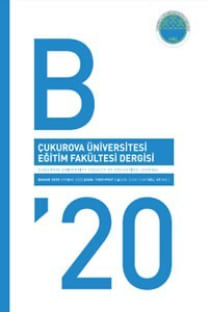Okul Psikolojik Danışmanlığı Açısından Toplum Psikolojisi Uygulamaları ve Okul-Toplum Ortaklıkları
Bu
çalışma, toplum psikolojisi pratiği kavramını ve Türkiye'deki okul ve toplum
arasındaki işbirliklerini araştırmaktadır. Bu çalışmada Batılı ülkelerde ve
Türkiye’deki okul psikolojik danışmanlara verilen geleneksel roller ele
alınmıştır. Bununla beraber Türkiye’deki okul psikolojik danışmanlarına
atfedilen Batı kaynaklı bazı roller kültürel farklılıklar açısından
incelenmiştir. Batı kaynaklı toplum işbirliği modellerinin diğer ülkelere veya
kültürlere doğrudan aktarılmasının özel dikkat gerektiren doğal zorluklara
sahip olduğu tartışılmıştır. Buradan hareketle, Türkiye'deki okul-toplum
ortaklıklarını güçlendirmek için öneriler sunulmuştur.
Anahtar Kelimeler:
Okul psikolojik danışmanı, Toplum psikolojisi, İş birlik, Kültür
Community Psychology Practice and School-Community Partnerships through the Lens of School Counseling Profession in Turkey
This
article explores the concept of community psychology practice and its
relationship to school and community partnerships in Turkey. The information in
this article is reviewed from the vantage point of the traditional roles
ascribed to school counselors in Western countries and cultural issues relevant
to the role of school counselors in Turkey. It is argued that direct transfer
of western community collaboration models to non-western countries or cultures
has inherent challenges that require special consideration. In that spirit,
several recommendations are provided to help enhancing partnerships in Turkey.
Keywords:
School counselor, Community psychology, Partnership, Culture,
___
- American School Counselor Association (2012). The ASCA National Model: A framework for school counseling programs, Alexandria, VA: Author.
- American Psychological Association (n.d.). International quality assurance for psychology education and training. Executive Summary. Retrieved from http://apa.oprg/international/governance/cirp/qa-assurance.aspx.
- Aydemir, B. (2014). Istatistiklerle genç issizlik. Retrieved from http://www.hurriyet.com.tr/istatistiklerle- genc-issizlik-27275308.
- Bemak, F. (2000). Transforming the role of the counselor to provide leadership in educational reform through collaboration. Professional School Counseling, 3(5), 323-338.
- Brayn, J. & Henry, L. (2012). A model for building school-family-community partnerships: Principals and process. Journal of Counseling & Development, 90, 408-420.
- Bryan, J., & Holcomb-McCoy, C. (2004). School counselors' perceptions of their involvement in school- family-community partnerships. Professional School Counseling, 7(3), 162-171.
- Bryan, J., & Holcomb-McCoy, C. (2007). An examination of school counselor involvement in school- family-community partnerships. Professional School Counseling, 10(5), 441-454.
- Culbreth, J. R., & Korkut, F. (2006). A Comparison of school counselor training programs B,between Turkey and the United States of America. Online Submission. Retrieved from http://files.eric.ed.gov/fulltext/ED495202.pdf.
- Dalton, J. & Wolfe, S. (2012). Competencies for community psychology practice. The Community Psychologist. 45(4). 8-14.
- Division 52, American Psychological Association, International Psychology Webinar Committee. (n.d.). International engagement in applied psychology in the Americas: Challenges and opportunities. Retrieved from http://bit.lyQiMIPA.
- Dogan, S. (1998). Counseling in Turkey: Current status and future challenges. Education Policy
- Analysis Archives, 6(12). Dogan, S. (2000). The historical development of counseling in Turkey. International Journal for the Advancement of Counselling, 22(1), 57-67.
- Epstein, J., & Van Voorhis, F. (2010). School counselors' roles in developing partnerships with families and communities for student success. Professional School Counseling, 14(1), 1- 14.
- Griffin, D., Farris, A. (2010). School counselors and collaboration: Finding resources through community asset mapping. Professional School Counseling, 13(5), 248-256.
- Hatunoğlu, Y., & Hatunoğlu, Y. (2006). Okullarda verilen rehberlik hizmetlerinin problem alanlari. Kastamonu Eğitim Dergisi, 14 (1), 333-338.
- İcli, G. (2001). Eğitim, istihdam ve teknoloji. Pamukkale Üniversitesi Eğitim Fakültesi Dergisi, 9(9), 65-71.
- International School Counseling Association. (2011). The international model for school counseling programs. Retrieved from http://iscainfo.com/wp- content/uploads/2014/06/International-Model-for-School-Counseling-Programs-Aug- 2011-First-Edition.pdf.
- Julian. D. A. (2006). Defining community psychology practice. The Community Psychologist. 39(4), 67-69.
- Julian, D. A. (n.d.). A community practice curriculum for school counselors. (Available from Center for Education and Training for Employment, 1900 Kenny Road, Columbus, OH 43210).
- Keys, S. G., Bemak, F., Carpenter, S. L. & King-Sears, M. E. (1998). Collaborative consultant: A new role for counselors serving at-risk youths. Journal of Counseling & Development, 76, 123-133.
- Korkut-Owen, F., Owen, D. W., & Ballestero, V. (2009). Counselors and administrators: The collaborative alliance in three countries. Eurasian Journal of Educational Research, 36, 23-38.
- Koşan, A. (2003). Eğitimde okul-endüstri işbirliği. Atatürk Üniversitesi Sosyal Bilimler Enstitüsü Dergisi, 2, 107-130.
- Mitchell, N. A., & Bryan, J. A. (2007). School-family-community partnerships: Strategies for school counselors working with caribbean immigrant families. Professional School Counseling, 10(4), 399-409.
- Owen, D. W., Korkut-Owen, F., & Kurter, M. F. (2011). Career development in Turkey: An evolving profession. Career Planning & Adult Development Journal, 27(1), 39-52
- Stockton, R., & Doğan, S. (2019). Examination of School Counselors' Statewide Listserv Interactions. Türk Psikolojik Danışma ve Rehberlik Dergisi, 9(53), 317-341.
- Stockton, R., & Güneri, O. Y. (2011). Counseling in Turkey: An evolving field. Journal of Counseling & Development, 89(1), 98-104.
- Terzi, Ş., Tekinalp, B. E., & Leuwerke, W. (2011). Psikolojik danışmanların okul psikolojik danışma ve rehberlik hizmetleri modeline dayalı olarak geliştirilen kapsamlı psikolojik danışma ve rehberlik programını değerlendirmeleri. Pegem Eğitim ve Öğretim Dergisi, 1(1), 51-60.
- Turkish Ministry of National Education (2016). Ulusal mesleki bilgi sistemi. Retrieved from http://mbs.meb.gov.tr/.
- Turkish Ministry of National Education (2017a). Millî Eğitim Bakanliği rehberlik hizmetleri yönetmeliği. Retrieved from http://www.resmigazete.gov.tr/eskiler/2017/11/20171110- 2.htm
- Turkish Ministry of National Education (2017b). Millî Eğitim Bakanliği rehberlik hizmetleri yönetmeliği. Retrieved from http://orgm.meb.gov.tr/www/mill-egitim-bakanligi-rehberlik-hizmetleri-yonetmeligi- yayimlandi/icerik/961
- Turkish Psychological Counseling and Guidance Association (n.d.). Bir psikolojik danismana 250 yerine 941 ogrenci dusuyor. Retrieved from http://www.turkpdristanbul.com/bir-rehber-ogretmene-250- yerine-941-ogrenci-dusuyor/.
- Turkish National Employment Organization (2016). Sikca sorulan sorular. Retrieved from http://www.alo170.gov.tr/sss/3/24/is-ve-meslek-danismanligi.
- Turkish Statistical Institute (2016). Adrese dayalı nüfus kayıt sistemi sonuçları. Retrieved from http://www.tuik.gov.tr/PreHaberBultenleri.do?id=21507
- Turkish Statistical Institute (2018). Isgucu istatistikleri. Retrieved from http://tuik.gov.tr/Start.do;jsessionid=RPGxbpCVjcvf9JhtQ0nt3ts1ncxsw775C1KwvZMY3xJSmj1RvT9J! 1316935301.
- ISSN: 1302-9967
- Yayın Aralığı: Yılda 3 Sayı
- Başlangıç: 2000
- Yayıncı: Çukurova Üniversitesi Matbaası
Sayıdaki Diğer Makaleler
Almanca Öğretmen Adaylarının Almanca Dilbilgisine Karşı Metaforik Algıları
Fen Bilimleri Dersinde Bilim Defteri Uygulaması: İlkokul 4. Sınıflar Üzerine Bir Araştırma
Burçin YEŞİLÇELEBİ BIYIK, E. Aysın ŞENEL
Okul Psikolojik Danışmanlığı Açısından Toplum Psikolojisi Uygulamaları ve Okul-Toplum Ortaklıkları
Mustafa YILMAZLAR, Alper ÇORAPÇIGİL
Ders Dışı Sportif Etkinliklere Yönelik Ebeveyn Tutum ve Görüşleri
